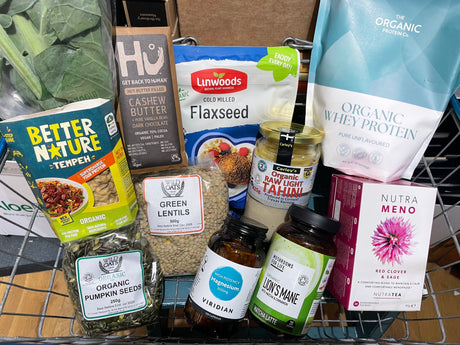Expert Advice from the Nutritional Therapists at Wild Oats
Stress and anxiety are some of the most common concerns we hear about at Wild Oats. Whether it’s due to work, personal challenges, or simply the fast pace of life, many people feel overwhelmed and unsure of how to cope.
While a certain amount of stress is normal and even helpful at times, chronic stress can take a serious toll on both body and mind. The good news? There are plenty of natural ways to manage stress — starting with understanding what it does to your body, and how you can support yourself through nutrition and lifestyle.
What Happens to Your Body Under Stress?
When you're under pressure, your nervous system releases the hormones cortisol and adrenaline. This is your body’s “fight or flight” response, designed to help you react quickly in high-stakes situations. In the short term, this response isn’t harmful — but when stress becomes long-term or chronic, it can negatively affect various systems in the body.
Physical Symptoms of Stress:
- Shortness of breath or rapid heartbeat
- Chest pain or tightness
- Headaches or dizziness
- Muscle tension or cramps
- Sleep disturbances
- Digestive issues (constipation, diarrhoea, bloating)
- Changes in libido or reproductive health
How Stress Affects Mental and Physical Health
Ongoing stress can have a major impact on your mood and mental clarity. It may leave you feeling anxious, irritable, low, or emotionally drained.
Common Mental and Emotional Signs of Stress:
- Difficulty focusing or making decisions
- Feeling overwhelmed or constantly worried
- Forgetfulness or brain fog
- Mood swings or low motivation
Behavioural Indicators of Stress:
- Changes in sleep patterns
- Overeating or loss of appetite
- Withdrawing from social situations
- Increased smoking or alcohol use
- Feeling more impatient or reactive
How Stress Affects the Brain
If you’ve ever felt foggy or forgetful when stressed, you’re not alone. Long-term stress can interfere with how your brain functions, affecting memory, attention, and emotional regulation. Over time, chronic stress may even contribute to inflammation and increase the risk of certain neurological and cardiovascular conditions.
How Stress Affects the Immune System
Stress doesn’t just affect your mind — it can also lower your body’s ability to fight off illness. Chronic stress weakens the immune system, making you more susceptible to colds, infections, and other health issues. Additional factors like a poor diet, exposure to environmental toxins, and certain health conditions can add to your body’s stress load and increase inflammation.
Natural Ways to Relieve Stress
If you’re feeling the effects of stress, the first step is to support your body through gentle, nourishing approaches. Here’s how:
1. Eat a Whole Food Diet
Focus on fresh, organic fruits and vegetables. These are rich in antioxidants and vitamin C, which help reduce cortisol levels and protect the body’s cells from stress-related damage.
2. Cut Back on Caffeine
Too much caffeine can increase anxiety, disrupt sleep, and elevate cortisol. Swap your coffee for a calming herbal tea or a caffeine-free coffee alternative like roasted chicory root.
3. Boost Magnesium and B Vitamins
Magnesium and B-complex vitamins are essential for energy production, nervous system support, and stress resilience. Load up on dark leafy greens, whole grains, almonds, lentils, and avocados.
4. Try Adaptogenic Herbs
Adaptogens are natural substances that help the body adapt to stress. Herbs like Ashwagandha, Rhodiola and Reishi mushroom can be taken in capsule, tincture, or tea form. For personalised guidance, speak to one of our Nutritional Therapists in-store.
How do you treat chronic stress and anxiety?
Relieving stress also means addressing the root causes. That might involve making changes in your job, improving personal relationships, or seeking professional support. If you’re feeling stuck, a nutritional therapist can help you identify imbalances and build a plan for a more balanced, happier life.
Our Top Supplement Picks for Stress:
In addition to lifestyle changes, certain supplements can help ease stress and support your wellbeing. Here are some of our favourites at Wild Oats:
- Magnesium (citrate, taurate, or glycinate): Supports over 300 bodily functions, including calming the nervous system.
- L-Theanine: An amino acid found in green tea, known to promote relaxation and improve focus.
- Vitamin C: Helps reduce cortisol, supports the adrenal glands, and boosts immunity.
- B-Complex Vitamins: Crucial for energy production and nervous system function. Studies suggest they can improve mood and reduce symptoms of anxiety and depression.
Shop Sleep, Stress & Mood Support
Need Support?
Come and chat with us in-store at Wild Oats in Bristol. Our trained Nutritional Therapists are here to offer personalised advice, and help you find the natural solutions that work best for your body and lifestyle.
Further reading and support for stress:
- NHS - Dealing with stress
- Mind - What is stress?
Written by Laura Walker, Nutritional Therapist and Natural Remedies Advisor and at Wild Oats.
Get 25% off your Nutrition Consultation, plus 15% off recommended supplements at Wild Oats.



